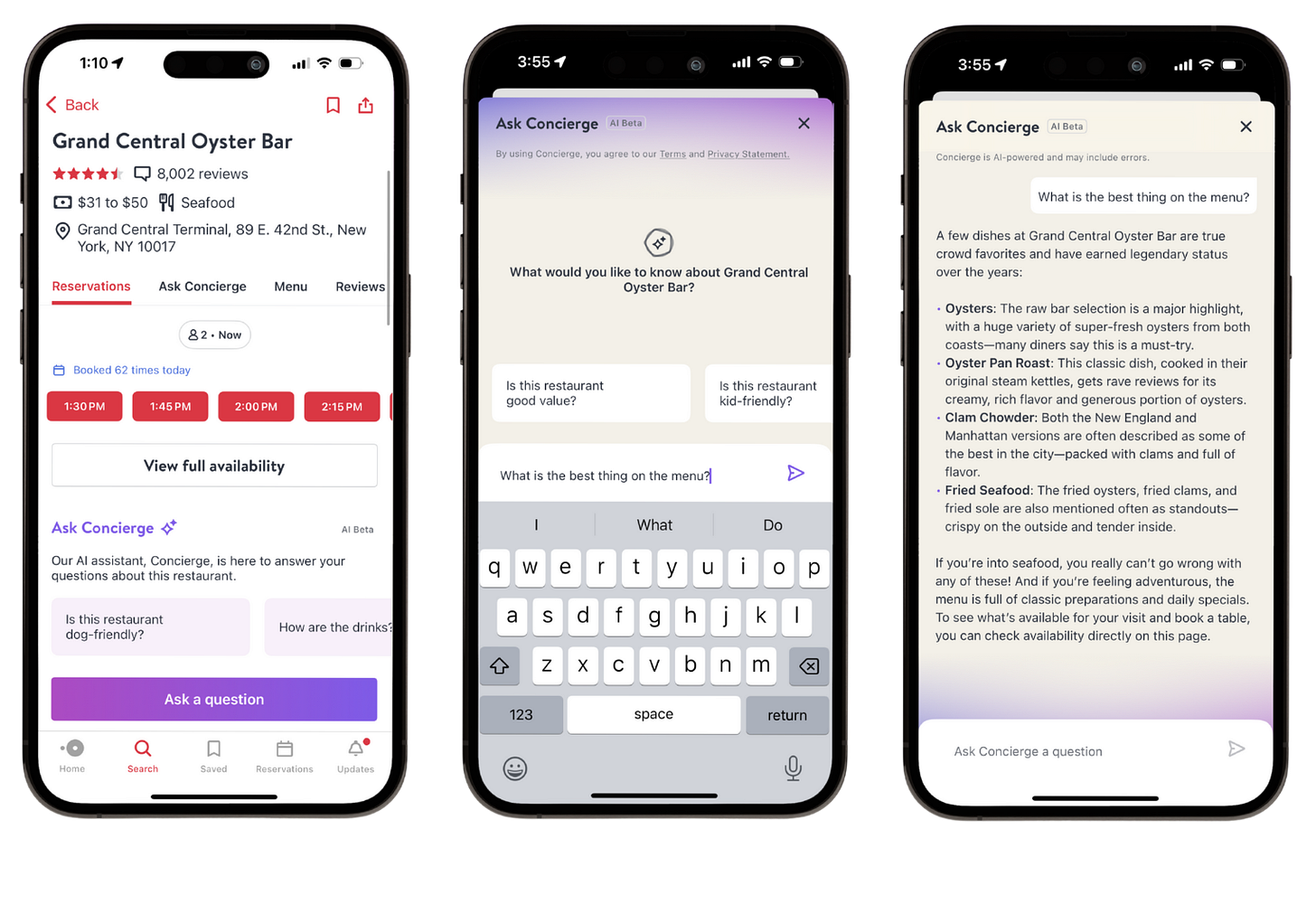OpenTable’s AI concierge wants to help
...and the company's CTO says it's just the start.
OpenTable’s newest employee is a bot. Launched today and available on mobile and on desktop, the reservations company’s AI concierge, a conversational chatbot, will answer questions about individual restaurants. OpenTable says its bot works like me “a helpful, in-the-know friend who’s done all the homework.1”
OpenTable’s concierge uses all the data it has about a restaurant, including descriptions, menus, and reviews, to help craft its answers.
“It's meant to help diners make decisions about whether a given restaurant is a good fit, or, once they're at the restaurant, what they might want to do,” says Sagar Mehta, OpenTable’s chief technology officer.
Realistically, the OpenTable concierge is not ready to replace your favorite in-the-know, restaurant-loving friend. Right now it’s able to answer about 80 percent of questions a user asks, Mehta told me. But, as it turns out, restaurants get a lot of the same questions… over, and over, and over.
It’s a start.
Recently, OpenTable research found that we spend about 20 minutes researching a restaurant before booking a table.
Over a quarter of us have decided not to book a table because we can’t find the information we’re looking for. And 17 percent admitted to ditching the prospective booking because they couldn’t find their desired information and didn’t feel like calling the business, which is a relatable but also kind of funny statistic.
Of course, as Mehta concedes, an AI is only as good as the data that feeds it. (Or, as a savvy panelist during a recent conference told me: Garbage in, garbage out.)
“I think ultimately what will happen over time is that we, as an industry, will figure out how to validate the truthiness or the usefulness of a given source,” he says.
We’ve already seen how early implementations of AI can backfire for restaurants.
This includes the time a Google AI summary errantly told a bunch of diners that a particular restaurant was offering brunch service when it definitely was not. (Tl;dr, it wasn’t really Google’s fault, but also there’s a lot of bad information on the internet.)
Mehta says OpenTable’s been testing its concierge with operators to find weaknesses. For example, if the bot is repeatedly suggesting old menu items to diners asking what to order, it might signal to the restaurant that it needs to update its menu on OpenTable. For more serious questions, like those about food allergies and ingredients, a fact-check is still best. “We can give you what we believe is an answer, but we also encourage the diner to check with the restaurant, because we know that’s a sensitive area,” Mehta says.
OpenTable tapped into APIs from major AI companies Perplexity and OpenAI to build its concierge, combining its own detailed data about restaurants and using top generative AI models to help craft good responses.
What tech comes from which partner?
“Without getting too technical,” Mehta says, “They're both fulfilling different parts of the value that we're trying to deliver.”
Currently, the concierge lives on restaurant profile pages.
There, it can answer questions, offer directions, suggest menu items, and offer prospective diners a sense of what to expect at a particular restaurant — the vibes, as they say. Eventually, Mehta says, the same concierge might be able to help beyond those pages, encouraging restaurant discovery on OpenTable, or offering a hyper-personalized experience inside the app.
Really, this is a response to the way online searches are evolving, and the technology is ready to meet the moment. Google’s ‘AI mode’ can already generate complex recommendations and itineraries; OpenAI’s Operator can book a restaurant table on OpenTable. Now, it’s just about putting the pieces together. Or, as Mehta says, anticipating the user’s needs based on everything you know about them.
Someday it even might help avert disaster.
“Maybe one day it can even be proactive and say, ‘By the way, you forgot the dining reservation for your husband's birthday, and it's time to book. Here are five options. Would you like me to make the booking?’”
Yes, actually, I would. Thanks, robot.
related content:
Google's AI wrongly said a restaurant served brunch
When Google debuted AI overviews in search results about a year ago, the company conceded that AI can and will make mistakes. To paraphrase: It’s new, it’s somewhat experimental, and we’re all sort of figuring out how this thing works. But recently I heard a story about the impact on a real restaurant when the bots get it wrong.
Get ready for ‘AI mode’
On Tuesday, Google hosted its annual I/O keynote, an event targeted at web developers, inside a 20,000-person amphitheater…
Shoutout to all the nerds who love homework as much as me!






